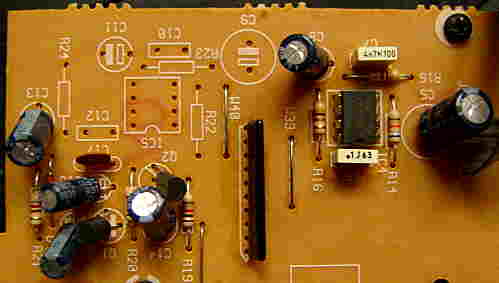| Bontempi
GT
759 |
|
digital keyboard with nice gritty zipper noise
sounds and rhythms |
|
|
This is the bigger brother of the small Bontempi
GT 509. It has the same gritty digital zipper noise sounds and
features 666 sound combinations. Unlike the latter it has 49 midsize keys
with accompaniment section and you can select 6 different timbres for manual
chords. Unfortunately it only accepts standard establishment chords.

Thanks to the longer keyboard it has now a real bass range with nicely
sonorous timbres. Also this specimen (I bought mine used) emits rests of
the same awful solvent chemical odour like the GT 509. This instrument
sounds and behaves extremely similar like Bontempi GT 509, thus
see there for details.
different main features:
-
49 midsize keys
-
2 built-in speakers (10cm, reasonable sound, mono)
-
keyboard chord section
-
single finger & fingered chord modes (only standard chords)
-
6 preset accompaniment sounds {el. piano, mute guitar, piano, accordion,
jazz organ, synth strings} (only for manual chord mode with rhythm off)
-
"chorus" is now labelled "diffusion"
-
separate accompaniment volume +/- buttons
-
8 bit sound generator sounds cleaner (less aliasing noise?) but has still
nice zipper noise.
-
CPU "Texas Instruments A45031PH, WX 87A7TVW, COMUS2743389" (80 pin SMD)
-
no battery alarm
-
jacks for AC-adapter & headphone
eastereggs:
-
PCB has empty solder holes for 2nd power amp =>possibly upgradeable to
stereo.
notes:
Despite this instrument has still nicely low bit resolution with much zipper
noise, it sounds cleaner, slightly warmer and less harsh than the GT 509.
I am not sure if only the speakers are better, or if the sound generator
has less aliasing noise. With trilled keys each new note occupies a new
sound channel, which produces a great phasing sound and volume increase
effect. The demo melodies always roar at maximum volume and can not be
set quieter; fortunately they are at least play not unbearable loud (unlike
the older Bontempi KS 4600) because
this keyboard plays not louder than high room volume.  The
PCB has empty solder holes for a 2nd identical power amplifier; apparently
the hardware was indeed designed in stereo, but the 2nd amp was omitted
to cut down costs. Strange is only that both amps would be connected with
the output of the same 8 bit DAC resistor array, but also my Bontempi
BS 2010 multiplexes the output from a single DAC to generate stereo
sound. Also the manual has a small note "stereo" in the technical data
section, despite this instrument in its actual form is mono.
The
PCB has empty solder holes for a 2nd identical power amplifier; apparently
the hardware was indeed designed in stereo, but the 2nd amp was omitted
to cut down costs. Strange is only that both amps would be connected with
the output of the same 8 bit DAC resistor array, but also my Bontempi
BS 2010 multiplexes the output from a single DAC to generate stereo
sound. Also the manual has a small note "stereo" in the technical data
section, despite this instrument in its actual form is mono.
The accompaniment accepts only standard establishment chords because
its fingered chord mode ("free chord II") simply ignores any non- chord
key combinations (the same stupid rubbish like with e.g. Yamaha
PSS-390 and many other modern sound bank keyboards). Although there
are 6 different accompaniment preset sounds selectable, they only take
effect in manual chord mode (with rhythm off). The accompaniments of the
rhythms only use always the same boring e-bass (or e-piano?) timbre.
A shorter variant of the Bontempi GT 759 (40 midsize keys, 1
speaker) was released as Bontempi GT 709 and GT 709N (different
panel colours). A fullsize variant (49 keys, 2 speakers, only 3 drumpads?)
was released as Bontempi GT 809. Bontempi originally had bought
this hardware technology from Farfisa, those released e.g. the variants
Farfisa
F404 (40 midsize keys, 1 speaker, no drumpads) and F498 (same
like Bontempi GT 809?). The modern successor of the Bontempi GT
759 is the Bontempi GT 770, which
has 100 preset "basic sounds" (instead of the only 36 of the GT 759), warmer
timbres and 12 note polyphony; the corresponding GT 709 successor is the
GT
720 (seen on eBay).
| removal
of these screws voids warranty... |
|
|
 |

|
|
| |
back
|
|





 The
PCB has empty solder holes for a 2nd identical power amplifier; apparently
the hardware was indeed designed in stereo, but the 2nd amp was omitted
to cut down costs. Strange is only that both amps would be connected with
the output of the same 8 bit DAC resistor array, but also my Bontempi
BS 2010 multiplexes the output from a single DAC to generate stereo
sound. Also the manual has a small note "stereo" in the technical data
section, despite this instrument in its actual form is mono.
The
PCB has empty solder holes for a 2nd identical power amplifier; apparently
the hardware was indeed designed in stereo, but the 2nd amp was omitted
to cut down costs. Strange is only that both amps would be connected with
the output of the same 8 bit DAC resistor array, but also my Bontempi
BS 2010 multiplexes the output from a single DAC to generate stereo
sound. Also the manual has a small note "stereo" in the technical data
section, despite this instrument in its actual form is mono.
